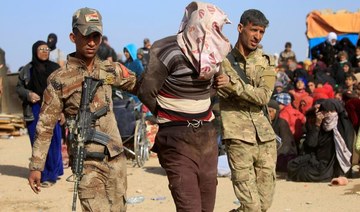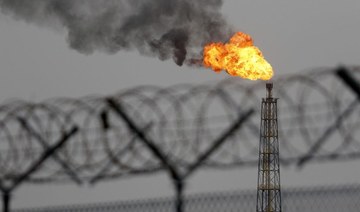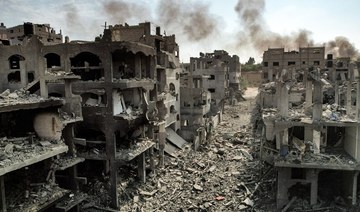LONDON: Qatar’s emir said on Monday that he is ready to contribute to every international and regional effort to find an immediate peaceful solution to the conflict in Ukraine.
Addressing the World Economic Forum taking place in Davos, Switzerland, Sheikh Tamim bin Hamad Al-Thani said that solving disputes through aggression is on the rise, and that he is in touch with all parties concerned in the Ukrainian crisis.
“We should never give up trying to bring parties together. As long as we believe our efforts could save even a single life, our attempts to mediate will be worth it,” the emir said.
He expressed sympathy with the millions of people who have been forced to flee their homes due to conflict regardless of their race and religion.
“We consider the value of each European life to be just as precious as someone from our region.
“We stand in solidarity with the millions of innocent refugees who are victims of this European war, and the victims of all other wars taking place right now — victims of every race, nationality and religion. I want us to help all of them.”
Sheikh Tamim also highlighted the suffering of the Palestinian people “who have been occupied for decades with no relief in sight.
“As we rightly apply laser focus to finding a diplomatic solution to the Ukrainian crisis, I hope we can equally give as much attention and effort to resolving all those forgotten or ignored conflicts.
“The most clear example is in Palestine which has been an open wound since the establishment of the United Nations. The escalation in illegal settlement aggression has been relentless, and the same goes for the continued attacks against the Palestinian people” Sheikh Tamim said.
To applause from the audience, the emir paid tribute to veteran Palestinian-American journalist Shireen Abu Akleh who was killed in Jenin while covering Israeli raids on a refugee camp in the West Bank on May 11.
“Shireen was covering the suffering of the Palestinian people for decades and our hearts are broken. Her death was just as horrific as the seven journalists killed in Ukraine since March this year, 18 other journalists killed in Palestine since 2000, and many other journalists killed in the line of duty in Iraq, Syria and Yemen,” he said.
The emir criticized governments for displaying double standards on the value of people based on their religion, region or race.
“In the 21st century we should not tolerate these aggressions, and we should not accept a world where governments have double standards about the value of people based on their religion, region or race,” he said.
He also hit out at what he called unprecedented attacks on Qatar becoming the first Arab country to host the FIFA World Cup.
“For decades now, the Middle East has suffered from discrimination,” he said.
“And I have found that such discrimination is largely based on people not knowing us, and in some cases, refusing to get to know us. Even today, there are still people who cannot accept the idea, that an Arab-Muslim country would host a tournament like the World Cup.
“These individuals, including many in positions of influence, have launched attacks, at a pace never seen before,” he said.
Emir says Qatar is ready to contribute to every effort to mediate between Russia and Ukraine
https://arab.news/2uspg
Emir says Qatar is ready to contribute to every effort to mediate between Russia and Ukraine
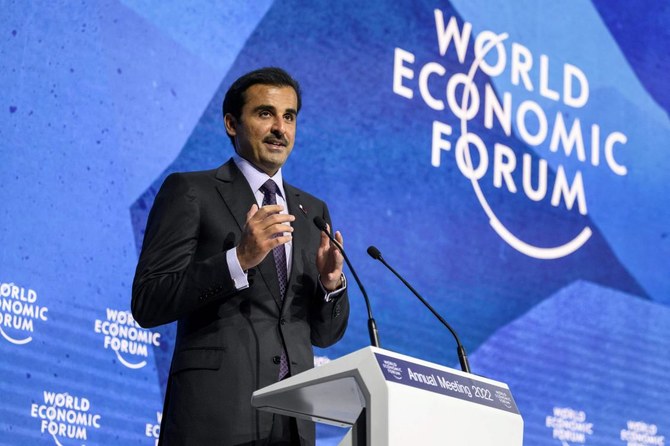
- Sheikh Tamim criticized governments for double standards on value of people based on religion and race
- Emir hit out at what he called unprecedented attacks on Qatar becoming first Arab country to host FIFA World Cup
Wars in Gaza and Sudan ‘drive hunger crisis affecting 280 million worldwide’
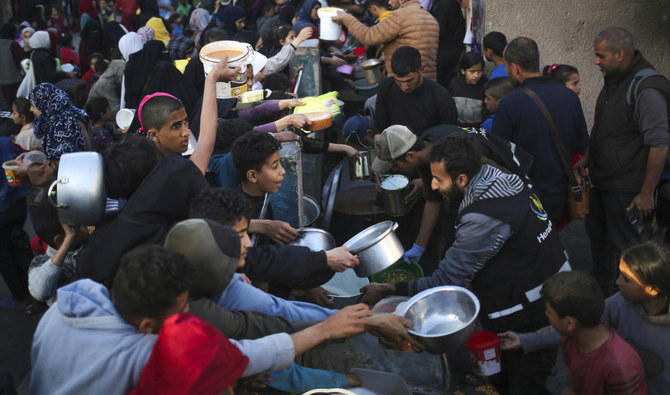
- New report on global food insecurity says outlook for 2024 is ‘bleak’
JEDDAH: More than 280 million people worldwide suffered from acute hunger last year in a food security crisis driven by conflicts in Gaza and Sudan, UN agencies and development groups said on Wednesday.
Economic shocks also added to the number of victims, which grew by 24 million compared with 2022, according to a report by the Food Security Information Network.
The report, which called the global outlook for this year “bleak,” is produced for an international alliance of UN agencies, the EU and governmental and non-governmental bodies.
Food insecurity is defined as when populations face food deprivation that threatens lives or livelihoods, regardless of the causes or length of time. More geographical areas experienced “new or intensified shocks” and there was a “marked deterioration in key food crisis contexts such as Sudan and the Gaza Strip,” said Fleur Wouterse, a senior official at the UN’s Food and Agricultue Organization.
Since the first report by the Global Food Crisis Network covering 2016, the number of food-insecure people has risen from 108 million to 282 million, Wouterse said. The share of the population affected within the areas concerned had doubled from 11 percent to 22 percent, she said.
Protracted major food crises are ongoing in Afghanistan, the Democratic Republic of Congo, Ethiopia, Nigeria, Syria and Yemen. “In a world of plenty, children are starving to death,” UN Secretary-General Antonio Guterres said.
“War, climate chaos and a cost-of-living crisis, combined with inadequate action, mean that almost 300 million people faced acute food crisis in 2023. Funding is not keeping pace with need.”
According to the report, situations of conflict or insecurity have become the main cause of acute hunger. For 2024, progress would depend on the end of hostilities, said Wouterse, who said aid could rapidly alleviate the crisis in Gaza or Sudan, for example, once humanitarian access to the areas was possible.
Yemen’s Houthis say they targeted American and Israeli ships
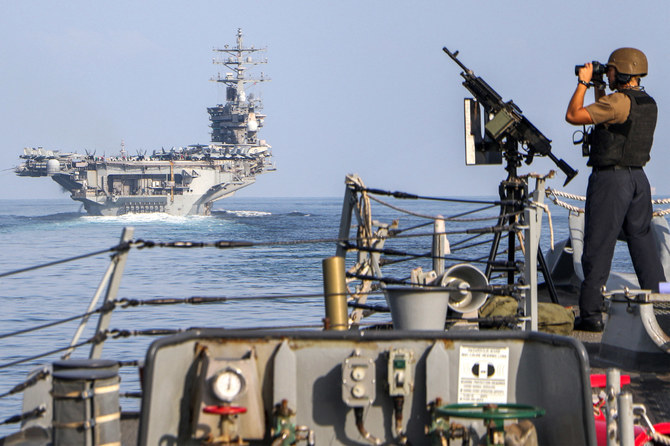
- The Iran-aligned group said it targeted the US ship Maersk Yorktown, an American destroyer in the Gulf of Aden and Israeli ship MSC Veracruz in the Indian Ocean
- “The Yemeni armed forces confirm they will continue to prevent Israeli navigation,” Sarea said
CAIRO/DUBAI: Houthi militants in Yemen have attacked what they said were two American ships and an Israeli vessel, the group’s military spokesman said on Wednesday, the first such attack in more than two weeks.
The Iran-aligned group said it targeted the US ship Maersk Yorktown, an American destroyer in the Gulf of Aden and Israeli ship MSC Veracruz in the Indian Ocean, the spokesman, Yahya Sarea, said in a televised speech.
Yemen’s Houthis have been attacking ships in the Red Sea region since November in what they say is a campaign of solidarity with Palestinians fighting Israel in Gaza.
“The Yemeni armed forces confirm they will continue to prevent Israeli navigation or any navigation heading to the ports of occupied Palestine in the Red and Arabian Seas, as well as in the Indian Ocean,” Sarea said on Wednesday.
Separately, British maritime security firm Ambrey said earlier on Wednesday that it was aware of an incident southwest of the port city of Aden, an area where the Houthis often target ships they say are linked to Israel or the United States.
The vessel reported an “explosion in the water” approximately 72 nautical miles east-southeast of Djibouti, an updated advisory from Ambrey said.
Houthi attacks have disrupted global shipping through the Suez Canal, forcing firms to re-route to longer and more expensive journeys around southern Africa. The United States and Britain have launched strikes on Houthi targets in Yemen.
Iraq hangs 11 convicted of ‘terrorism’: security, health sources
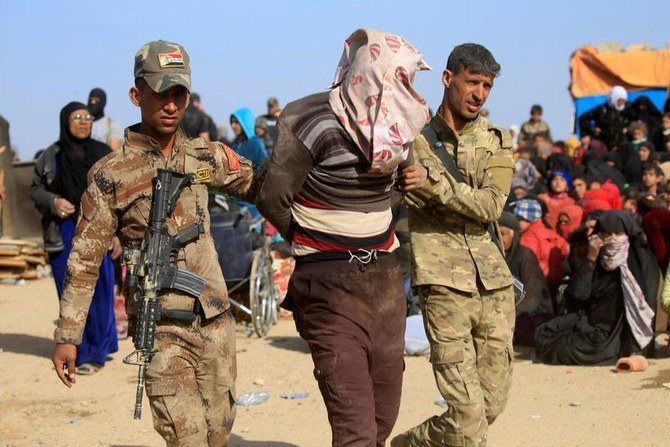
- Under Iraqi law, terrorism and murder offenses are punishable by death, and execution decrees must be signed by the president
- A security source in Iraq’s southern Dhi Qar province told AFP that 11 “terrorists from the Daesh group” were executed by hanging at a prison in Nasiriyah
NASIRIYAH, Iraq: Iraqi authorities have executed at least 11 people convicted of “terrorism” this week, security and health sources said Wednesday, with rights group Amnesty International condemning an “alarming lack of transparency.”
Under Iraqi law, terrorism and murder offenses are punishable by death, and execution decrees must be signed by the president.
A security source in Iraq’s southern Dhi Qar province told AFP that 11 “terrorists from the Daesh group” were executed by hanging at a prison in the city of Nasiriyah, “under the supervision of a justice ministry team.”
A local medical source confirmed that the health department had received the bodies of 11 executed people.
They were hanged on Monday “under Article 4 of the anti-terrorism law,” the source added, requesting anonymity due to the sensitivity of the issue.
All 11 were from Salahaddin province and the bodies of seven had been returned to their families, the medical official said.
Iraqi courts have handed down hundreds of death and life sentences in recent years for people convicted of membership in “a terrorist group,” an offense that carries capital punishment regardless of whether the defendant had been an active fighter.
Iraq has been criticized for trials denounced by rights groups as hasty, with confessions sometimes obtained under torture.
Amnesty in a statement on Wednesday condemned the latest hangings for “overly broad and vague terrorism charges.”
It said a total of 13 men were executed on Monday, including 11 who had been “convicted on the basis of their affiliation to the so-called Daesh armed group.”
The two others, arrested in 2008, “were convicted of terrorism-related offenses under the Penal Code after a grossly unfair trial,” Amnesty said citing their lawyer.
Biden says Israel must allow aid to Palestinians ‘without delay’
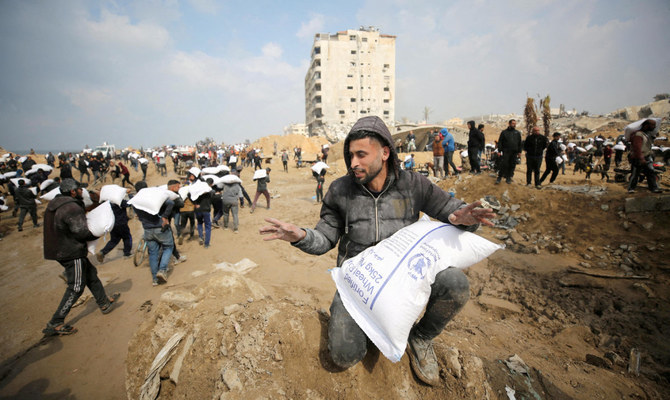
- “We’re going to immediately secure that aid and surge it,” Biden said
- “Israel must make sure all this aid reaches the Palestinians in Gaza without delay“
WASHINGTON: President Joe Biden on Wednesday demanded that new humanitarian aid be allowed to immediately reach Palestinians in the Gaza Strip as key US ally Israel fights Hamas there.
“We’re going to immediately secure that aid and surge it... including food, medical supplies, clean water,” Biden said after signing a massive military aid bill for Israel and Ukraine, which also included $1 billion in humanitarian aid for Gaza.
“Israel must make sure all this aid reaches the Palestinians in Gaza without delay,” he said.
US-Israel relations have been strained by Israel’s conduct of the war in Gaza and Israeli Prime Minister Benjamin Netanyahu’s plan to send troops into the southern Gazan city of Rafah, where 1.5 million people are sheltering, many in makeshift encampments.
“This bill significantly — significantly — increases humanitarian assistance we’re sending to the innocent people of Gaza who are suffering badly,” Biden said.
“They’re suffering the consequences of this war that Hamas started, and we’ve been working intently for months to get as much aid to Gaza as possible.”
Israel hits Lebanese border towns with 14 missiles
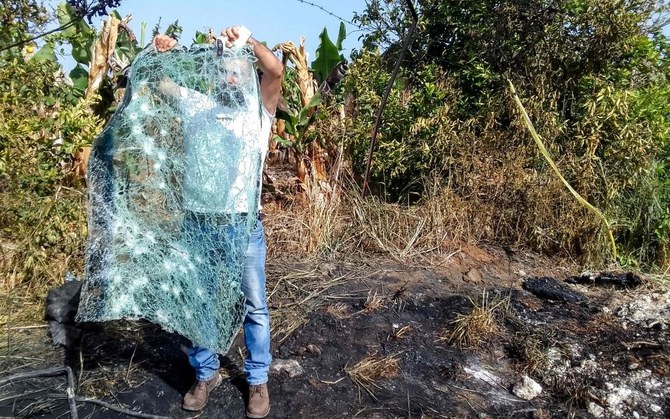
- Hezbollah targets Israeli settlements in retaliation for Hanin civilian deaths
- Hezbollah said it attacked the Shomera settlement with dozens of Katyusha rockets
BEIRUT: Clashes between Hezbollah and Israeli forces escalated sharply on Wednesday, the 200th day of conflict in southern Lebanon’s border area.
Israeli airstrikes created a ring of fire around Lebanese border towns, with at least 14 missiles hitting the area.
In the past two days, military activity in the border region has increased, with Hezbollah targeting areas in northern Acre for the first time in the conflict.
On Wednesday, Israeli strikes hit the outskirts of Aita Al-Shaab, Ramya, Jabal Balat, and Khallet Warda.
The Israeli military said it had destroyed a missile launching pad in Tair Harfa, and targeted Hezbollah infrastructure in Marqaba and Aita Al-Shaab.
Israeli artillery also struck areas of Kafar Shuba and Shehin “to eliminate a potential threat.”
Hezbollah also stepped up its operations, saying this was in retaliation for the “horrific massacre committed by the Israeli enemy in the town of Hanin, causing casualties and injuries among innocent civilians.”
A woman in her 50s and a 12-year-old girl, both members of the same family, were killed in the Israeli airstrike. Six other people were injured.
Hezbollah said it attacked the Shomera settlement with dozens of Katyusha rockets.
The group said it also targeted Israeli troops in Horsh Natawa, and struck the Al-Raheb site with artillery.
It also claimed to have killed and wounded Israeli soldiers in an attack on the Avivim settlement.
Israeli news outlets said that a rocket-propelled grenade hit a house in the settlement, setting the dwelling ablaze.
Hezbollah’s military media said that in the past 200 days of fighting with Israel, 1,998 operations had been carried out from Lebanon, Yemen and Iraq, including 1,637 staged by Hezbollah.









